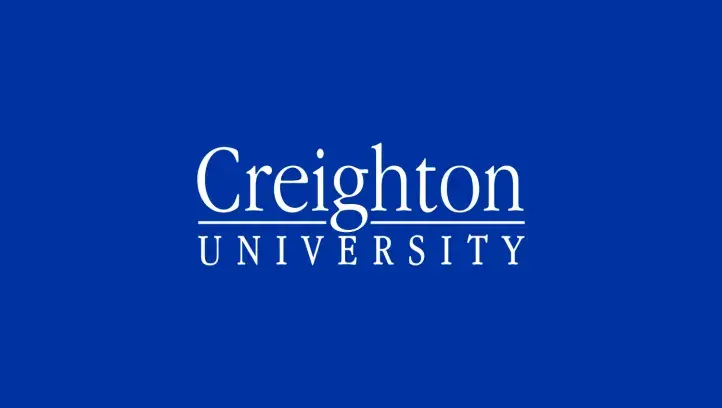
Cancer journey inspires student author to complete book
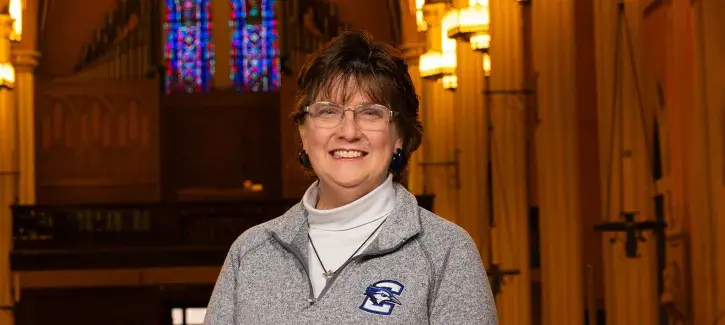
Lisa Kelly has always been a planner. But her plans took a drastic turn in June of 2021 when she was on an eight-day Ignatian retreat at the Creighton Retreat Center in rural Griswold, Iowa, as a student in Creighton’s Master in Christian Spirituality Program (CSP). She felt awful but thought it might be a bad sinus infection.
She had a fellow retreatant take her to a hospital emergency room. Kelly left her car in the Retreat Center parking lot, believing she would be back soon. The doctors tested her for COVID. Negative. They then performed a chest X-ray.
“My chest lit up like a Christmas tree,” she says. She was admitted to the hospital. Over the next 18 days, she would undergo a battery of tests. The result: She was diagnosed with AITL (angioimmunoblastic T-cell-30 lymphoma) a rare, aggressive form of blood cancer.
It was Stage IV.
“I was told I had a 50-50 chance of being alive in a year,” Kelly says.
On top of all that, she and her husband, Tom, a professor of theology at Creighton, were planning to move to Spain the next month, where Tom would teach and Lisa would offer Ignatian pilgrimages. They had secured visas, lined up an apartment in Madrid and even sold their house in Omaha.
“My plan was ripped up. My goals were gone.”
Well, not completely gone.
“There were things I wanted to do with my daughter and my other kids,” she says. (Lisa and Tom are the parents of four grown children: Lem, Andrew, Michael and Cate, who, at the time of her diagnosis, were 27, 26, 24 and 19, respectively.) “There were other goals I still wanted to do, and that was a huge saving grace for me. In some ways, the process [of goal planning] became even more important, because when you only have a year to live, that last year, you better live it well.”
And, there was her unfinished book. Begun years earlier, it was a labor of love, inspired by her twin passions of goal planning and Ignatian spirituality (she has been involved in the Ignatian Associates lay community in Omaha for more than two decades, and participated in an Ignatian pilgrimage through Creighton to Spain and Italy in 2018).
She also was halfway through the Christian spirituality degree program — which she describes as transformational, not only in terms of her writing, but in her own journey.
“Beyond the faculty and the students of the CSP community that held me and Tom through my illness, the depth of growth in my faith and inspiration for living this life only strengthened my desire to take the classes, write the papers and engage in the material,” she says. “No longer was getting a degree a box to be checked, but rather an experience of discovering the Holy Spirit thriving during what would otherwise have been the darkest months of my life.”
Fast forward to today, Lisa is cancer-free; her book, The Spiritual Path, came out in January of this year, published by Loyola Press; and she will graduate from Creighton’s Christian Spirituality Program in August.
Beating Cancer
After being diagnosed with cancer, Lisa underwent four different chemotherapy treatments, none of which worked. By January of 2022, she had celebrated her “last” Christmas, planned her funeral at St. John’s Church, her bones were decalcifying, she had a cancerous lump on the back of her head, and her doctors had given her bleak news.
“My doctors had come to me and said, ‘The chemo’s not working. We can do a bone marrow transplant to buy you about six months or you can call hospice and we’re done with treatments,’” she says. “And, you have 24 hours to decide.”
Lisa called her spiritual director, and they agreed there was no “best” moral course and that God would be with her no matter her decision. She flipped back and forth all night, but finally gained clarity in reflecting on her daughter’s upcoming study abroad trip to Colombia, South America. (Cate, who now lives in Bhutan, was studying anthropology at Seattle University at the time.)
“I used Ignatian imagination, and I didn’t want her to come home from her study abroad to my funeral, so I said, ‘Fine, I’ll do the transfusion.’ If I get myself six months, it’s worth it.”
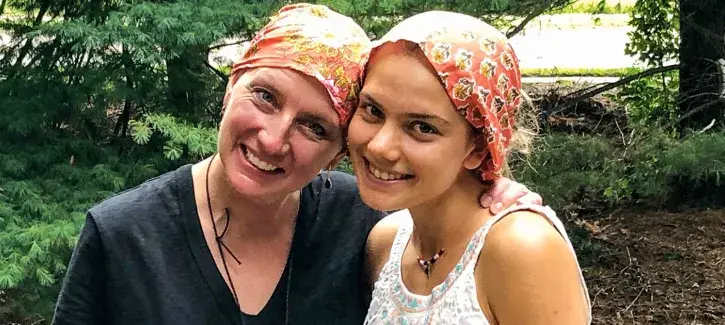
While a 100% bone marrow match, of course, would be the most ideal, the doctors needed to move quickly. They decided Cate was the best match, at 50%. And she became the donor. It was a two-day process, and on the second day, Cate was to leave for Colombia.
“On the second day, she was there from 7 a.m. until noon, we grab lunch, I take her to the airport, and I say goodbye, not knowing if I will still be alive when she comes back.”
Lisa spent the next six weeks in the hospital undergoing treatment. First radiation, twice a day for five days. Then injections of her daughter’s stem cells. Patients who reach 100 days, she says, are considered to have survived the procedure. Lisa made 100 days, welcomed her daughter home, and celebrated her 30th wedding anniversary with Tom. But still, the Stage IV cancer remained. She underwent some experimental treatments, but the medical prognosis was not good. She received hope and comfort in the multitude of prayers from others.
“Dec. 6, 2023, I had another bone marrow biopsy, I’m going through chemo, and the doctor looked at me and said, ‘I don’t know how to treat you,” she says, “because there’s nothing there to treat.’” The cancer was gone.
“It was truly miraculous,” she says. “I fully believe God works miracles through doctors and nurses and researchers so to say it was miraculous is not to say magical but grace-filled and gift-filled.”
The Book
In 2007, Lisa was serving as executive director of Leadership for Life, an Omaha nonprofit she co-founded, that helped people integrate faith-based leadership skills into their personal and professional life. Participants met once a month for six months, and Lisa, who was trained as a Gallup-certified strengths coach, facilitated the sessions.
One of the Leadership for Life board members introduced Lisa to the book Your Best Year Yet! by Omaha native Jinny Ditzler. Lisa was drawn to the goal-oriented principles of the best-selling book and even completed the Best Year Yet leadership and coaching system. But she also yearned for something that would be more reflective of her Catholic faith.
On a two-hour plane ride, she had an epiphany: Why not infuse Ignatian language and principles into the program and make it more faith-based? She put together an outline and started sharing the process as a two-and-a-half-day retreat.
“What’s unique about it, which I haven’t seen in any other strategic planning or personal planning, is I frame it around relationships,” Lisa says, “because God is in your relationships.”
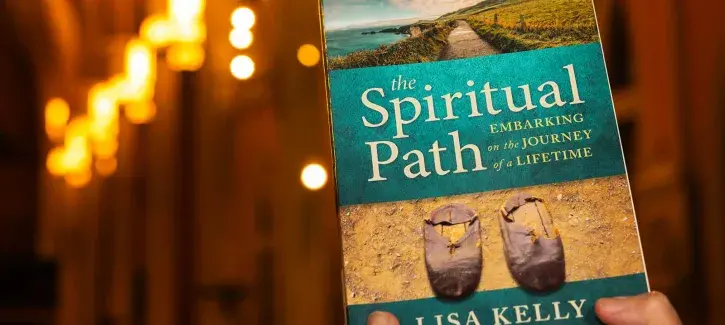
The book asks readers to identify the crucial relationships in their lives and to set goals around those relationships. “Think, imagine, dream with God: What’s possible in this relationship?” she says. “It’s that Ignatian imagination that really sets your goals.”
Lisa says the book is meant to be very practical, allowing readers to discern their own, unique spiritual path. Each chapter starts with a question, and the book ends with a one-page Spiritual Path Plan to map the journey. While it is written from an Ignatian perspective, its principles can guide individuals, couples or teams of all faiths, she says.
Acknowledging one’s value and self-worth is an essential part of the process. “You really have to reflect on your identity,” Lisa says. “We all hear these messages about our worthlessness or our inabilities or our lack of agency. The idea is to name that and face it head on with the understanding that that is not who God creates you to be, and that is not who you are in the eyes of God.”
The book also discusses establishing a sacred mantra, through which one can establish healthy goals. “My sacred mantra, or my identity, is, ‘I have insights to share,’ because my spirit not-of-God voice is, ‘Who are you? You don’t have a PhD.’”
Lisa says she’s feeling good, although she still has lingering health issues; she’s grateful for Creighton’s Christian Spirituality Program and the deeper understanding it has given her of Ignatian spirituality; and she’s hopeful about the future and sharing her book with others.
“This time that we’re given really is a huge gift,” Lisa says. “What we do in the next six months of our lives is really important. This life is precious; everything is precious.”
Christian Spirituality Program: Fostering Relationships, Educating Leaders
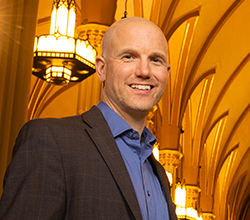
When it was introduced in 1974, Creighton University’s Christian Spirituality Program (CSP) was one of the first of its kind in the country — a master’s program rooted in the Ignatian tradition that trained spiritual directors.
Today, 50 years later, the CSP’s more than 1,500 graduates serve a wide range of ministries and denominations across the country and around the world, making a difference in their cities and churches.
The program is grounded in the Spiritual Exercises of St. Ignatius of Loyola, founder of the Jesuit religious order, and combines graduate-level study, community learning and a commitment to apostolic ministry.
Classes were originally only offered in person over the summer. Now, the program provides a hybrid model in which students can take classes online in the fall and spring, along with an in-person summer term. Students, who can complete the coursework for the degree in three years, are encouraged to make a directed eight-day retreat at the Creighton University Retreat Center.
“The community of CSP is a real strength,” says Jay Carney, PhD, professor of theology and CSP director. “The relationships that form during the summers continue to shape alumni years after they graduate. There’s this vulnerability that students show, and even as alumni, they carry a hunger to learn academically and grow spiritually.”




